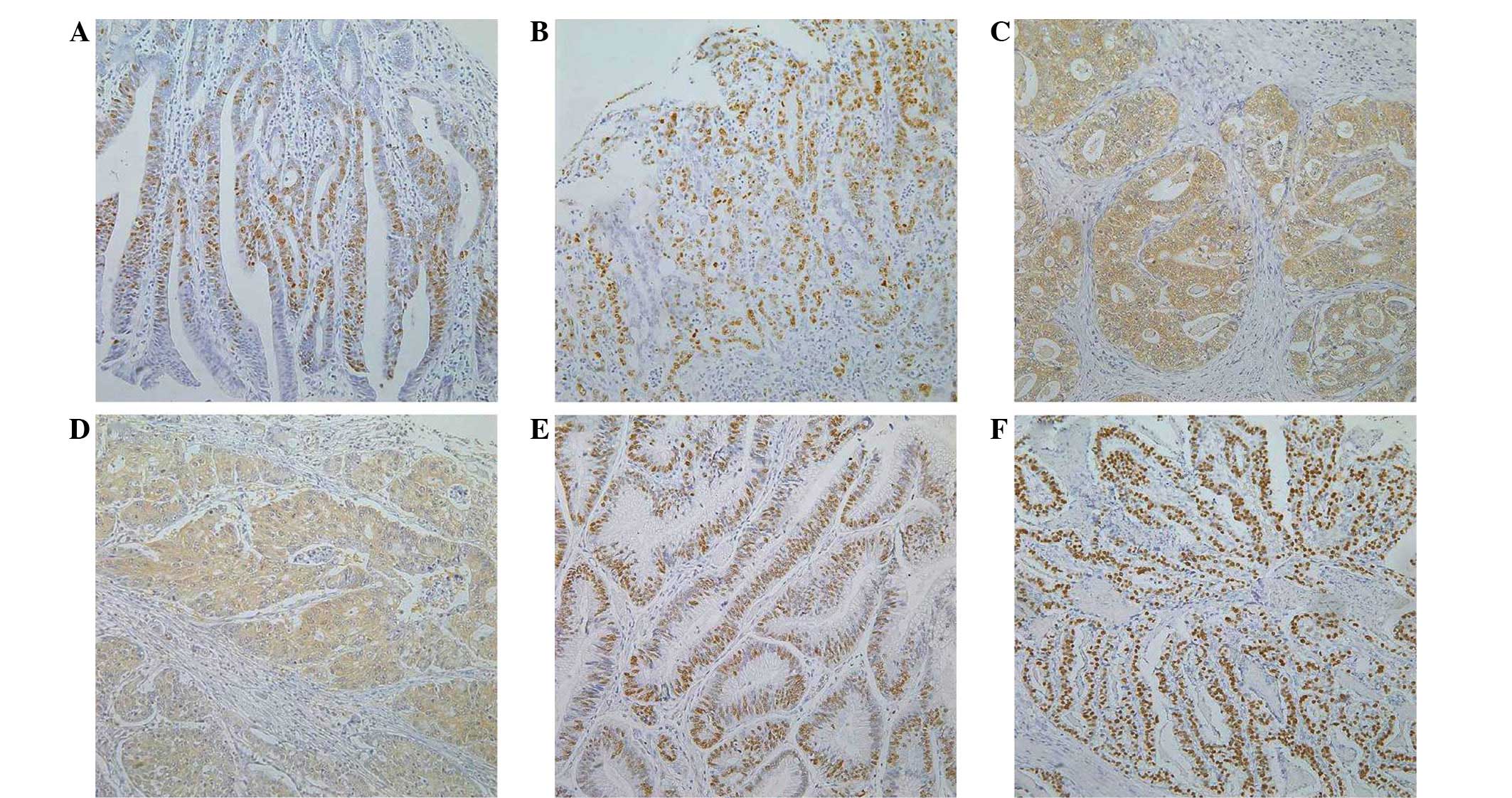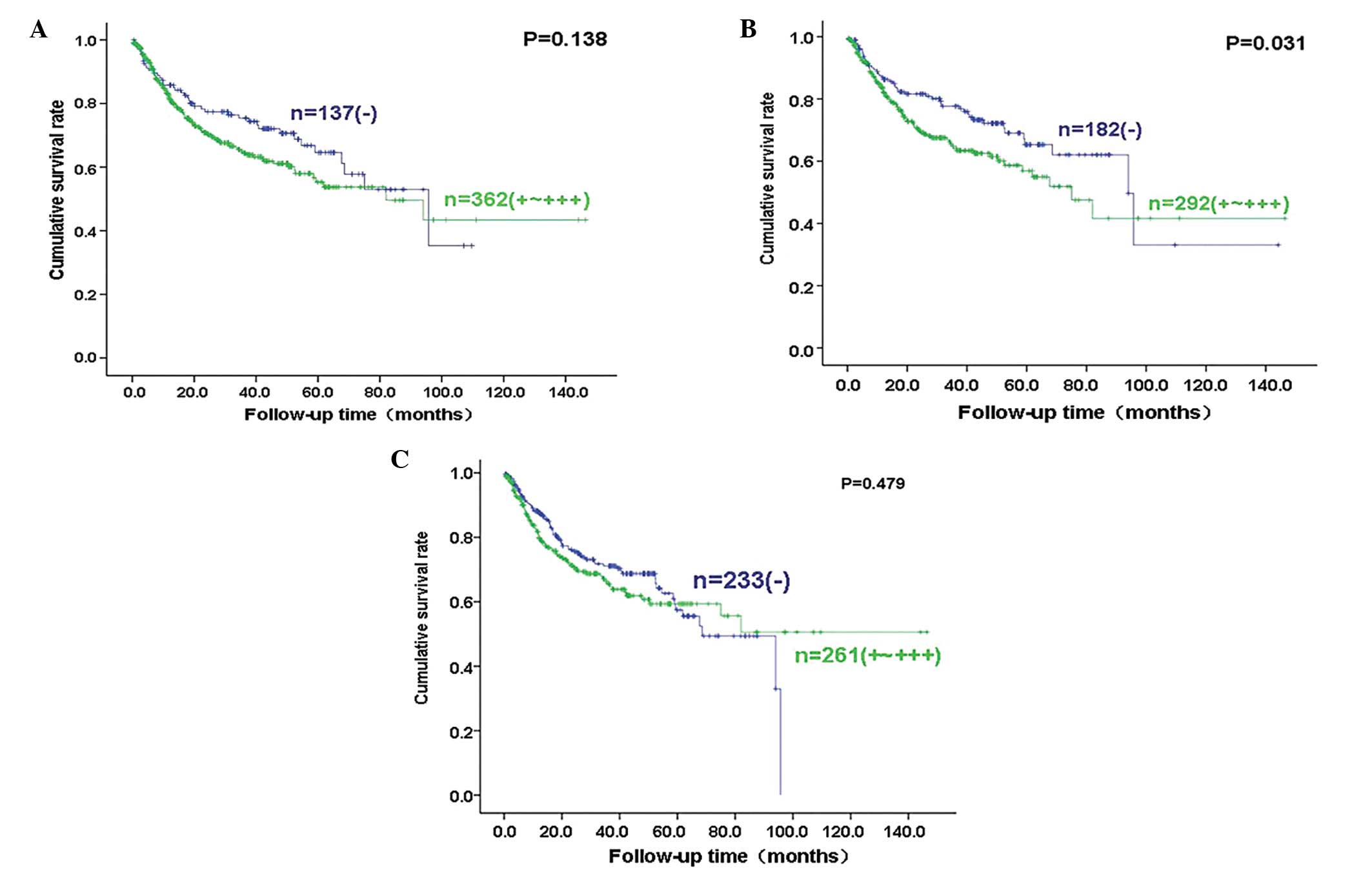|
1
|
Rivera F, Vega-Villegas ME and López-Brea
MF: Chemotherapy of advanced gastric cancer. Cancer Treat Rev.
33:315–324. 2007. View Article : Google Scholar
|
|
2
|
Kelley JR and Duggan JM: Gastric cancer
epidemiology and risk factors. J Clin Epidemiol. 56:1–9. 2003.
View Article : Google Scholar : PubMed/NCBI
|
|
3
|
Scholzen T and Gerdes J: The Ki-67
protein: from the known and the unknown. J Cell Physiol.
182:311–322. 2000. View Article : Google Scholar : PubMed/NCBI
|
|
4
|
Endl E and Gerdes J: The Ki-67 protein:
fascinating forms and an unknown function. Exp Cell Res.
257:231–237. 2000. View Article : Google Scholar : PubMed/NCBI
|
|
5
|
Chino O, Osamura Y, Kise Y, Nishi T,
Shimada H, Tanaka M, Kijima H and Makuuchi H: Acceleration of the
proliferative activity of esophageal carcinoma with invasion beyond
the muscularis mucosae; immunohistochemical analysis using MIB-1
for the Ki-67 antigen. Tokai J Exp Clin Med. 32:115–120. 2007.
|
|
6
|
Zheng HC, Sun JM, Wei ZL, Yang XF, Zhang
YC and Xin Y: Expression of Fas ligand and caspase-3 contributes to
formation of immune escape in gastric cancer. World J
Gastroenterol. 9:1415–1420. 2003.PubMed/NCBI
|
|
7
|
Kumar S: The apoptotic cysteine protease
CPP32. Int J Biochem Cell Biol. 29:393–396. 1997. View Article : Google Scholar : PubMed/NCBI
|
|
8
|
Sternberg MJ, Bates PA, Kelley LA and
MacCallum RM: Progress in protein structure prediction: assessment
of CASP3. Curr Opin Struct Biol. 9:368–373. 1999. View Article : Google Scholar : PubMed/NCBI
|
|
9
|
Soussi T: The p53 pathway and human
cancer. Br J Surg. 92:1331–1332. 2005. View
Article : Google Scholar : PubMed/NCBI
|
|
10
|
Marreiros A, Dudgeon K, Dao V, Grimm MO,
Czolij R, Crossley M and Jackson P: KAI1 promoter activity is
dependent on p53, junB and AP2: evidence for a possible mechanism
underlying loss of KAI1 expression in cancer cells. Oncogene.
24:637–649. 2005. View Article : Google Scholar
|
|
11
|
Ito R, Nakayama H, Yoshida K, Oda N and
Yasui W: Loss of maspin expression is associated with development
and progression of gastric carcinoma with p53 abnormality. Oncol
Rep. 12:985–990. 2004.PubMed/NCBI
|
|
12
|
Ala-aho R, Grénman R, Seth P and Kähäri
VM: Adenoviral delivery of p53 gene suppresses expression of
collagenase-3 (MMP-13) in squamous carcinoma cells. Oncogene.
21:1187–1195. 2002. View Article : Google Scholar : PubMed/NCBI
|
|
13
|
Yan C, Wang H and Boyd DD: ATF3 represses
72-kDa type IV collagenase (MMP-2) expression by antagonizing
p53-dependent transactivation of the collagenase promoter. J Biol
Chem. 277:10804–10812. 2002. View Article : Google Scholar : PubMed/NCBI
|
|
14
|
Loging WT and Reisman D: Inhibition of the
putative tumor suppressor gene TIMP-3 by tumor-derived p53 mutants
and wild type p53. Oncogene. 18:7608–7615. 1999. View Article : Google Scholar : PubMed/NCBI
|
|
15
|
Chen SL, Wu YS, Shieh HY, Yen CC, Shen JJ
and Lin KH: P53 is a regulator of the metastasis suppressor gene
Nm23-H1. Mol Carcinog. 36:204–214. 2003. View Article : Google Scholar : PubMed/NCBI
|
|
16
|
de la Fuente MT, Casanova B, Cantero E,
Hernández del Cerro M, Garcia-Marco J, Silva A and Garcia-Pardo A:
Involvement of p53 in alpha4beta1 integrin-mediated resistance of
B-CLL cells to fludarabine. Biochem Biophys Res Commun.
311:708–712. 2003.PubMed/NCBI
|
|
17
|
Zheng H, Tsuneyama K, Cheng C, Takahashi
H, Cui Z, Murai Y, Nomoto K and Takano Y: An immunohistochemical
study of P53 and Ki-67 in gastrointestinal adenoma and
adenocarcinoma using tissue microarray. Anticancer Res.
26:2353–2360. 2006.PubMed/NCBI
|
|
18
|
Sobin LH and Wittekind CH: TNM
Classification of Malignant Tumors. 6th edition. John Wiley and
Sons; Hoboken, NJ: 2002
|
|
19
|
Zheng H, Takahashi H, Murai Y, Cui Z,
Nomoto K, Miwa S, Tsuneyama K and Takano Y: Pathobiological
characteristics of intestinal and diffuse-type gastric carcinoma in
Japan: an immunostaining study on the tissue microarray. J Clin
Pathol. 60:273–277. 2007. View Article : Google Scholar
|
|
20
|
Zheng HC, Li XH, Hara T, Masuda S, Yang
XH, Guan YF and Takano Y: Mixed-type gastric carcinomas exhibit
more aggressive features and indicate the histogenesis of
carcinomas. Virchows Arch. 452:525–534. 2008. View Article : Google Scholar : PubMed/NCBI
|
|
21
|
Kumada T, Tsuneyama K, Hatta H, Ishizawa S
and Takano Y: Improved 1-h rapid immunostaining method using
intermittent microwave irradiation: practicability based on 5 years
application in Toyama Medical and Pharmaceutical University
Hospital. Mod Pathol. 17:1141–1149. 2004.
|
|
22
|
Czyzewska J, Guzińska-Ustymowicz K,
Pryczynicz A, Kemona A and Bandurski R: Immunohistochemical
evaluation of Ki-67, PCNA and MCM2 proteins proliferation index
(PI) in advanced gastric cancer. Folia Histochem Cytobiol.
47:289–296. 2009. View Article : Google Scholar : PubMed/NCBI
|
|
23
|
Lazăr D, Tăban S, Sporea I, Dema A,
Cornianu M, Lazăr E, Goldiş A and Vernic C: Ki-67 expression in
gastric cancer. Results from a prospective study with long-term
follow-up. Rom J Morphol Embryol. 51:655–661. 2010.PubMed/NCBI
|
|
24
|
Lee HE, Kim MA, Lee BL and Kim WH: Low
Ki-67 proliferation index is an indicator of poor prognosis in
gastric cancer. J Surg Oncol. 102:201–206. 2010. View Article : Google Scholar : PubMed/NCBI
|
|
25
|
Joo YE, Chung IJ, Park YK, Koh YS, Lee JH,
Park CH, Lee WS, Kim HS, Choi SK, Rew JS, Park CS and Kim SJ:
Expression of cyclooxygenase-2, p53 and Ki-67 in gastric cancer. J
Korean Med Sci. 21:871–876. 2006. View Article : Google Scholar : PubMed/NCBI
|
|
26
|
Oshima CT, Iriya K and Forones NM: Ki-67
as a prognostic marker in colorectal cancer but not in gastric
cancer. Neoplasma. 52:420–424. 2005.PubMed/NCBI
|
|
27
|
Kikuyama S, Kubota T, Shimizu K and
Miyakita M: Ki-67 antigen expression in relation to
clinicopathological variables and prognosis in gastric cancer.
Oncol Rep. 5:867–870. 1998.PubMed/NCBI
|
|
28
|
Xu L, Zhang SM, Wang YP, Zhao FK, Wu DY
and Yan X: Relationship between DNA ploidy, expression of Ki-67
antigen and gastric cancer metastasis. World J Gastroenterol.
5:10–11. 1999.PubMed/NCBI
|
|
29
|
He WL, Li YH, Yang DJ, Song W, Chen XL,
Liu FK, Wang Z, Li W, Chen W, Chen CY, He YL and Zhan WH: Combined
evaluation of centromere protein H and Ki-67 as prognostic
biomarker for patients with gastric carcinoma. Eur J Surg Oncol.
39:141–149. 2013. View Article : Google Scholar : PubMed/NCBI
|
|
30
|
Stepień A, Izdebska M and Grzanka A: The
types of cell death. Postepy Hig Med Dosw (Online). 61:420–428.
2007.(In Polish).
|
|
31
|
Li YH, Wang C, Meng K, Chen LB and Zhou
XJ: Influence of survivin and caspase-3 on cell apoptosis and
prognosis in gastric carcinoma. World J Gastroenterol.
10:1984–1988. 2004.PubMed/NCBI
|
|
32
|
Hoshi T, Sasano H, Kato K, Yabuki N, Ohara
S, Konno R, Asaki S, Toyota T, Tateno H and Nagura H:
Immunohistochemistry of Caspase3/CPP32 in human stomach and its
correlation with cell proliferation and apoptosis. Anticancer Res.
18:4347–4353. 1998.PubMed/NCBI
|
|
33
|
Isobe N, Onodera H, Mori A, Shimada Y,
Yang W, Yasuda S, Fujimoto A, Ooe H, Arii S, Kitaichi M and Imamura
M: Caspase-3 expression in human gastric carcinoma and its clinical
significance. Oncology. 66:201–209. 2004. View Article : Google Scholar : PubMed/NCBI
|
|
34
|
Steele RJ and Lane DP: P53 in cancer: a
paradigm for modern management of cancer. Surgeon. 3:197–205. 2005.
View Article : Google Scholar : PubMed/NCBI
|
|
35
|
Gonçalves AR, Carneiro AJ, Martins I, de
Faria PA, Ferreira MA, de Mello EL, Fogaça HS, Elia CC and de Souza
HS: Prognostic significance of p53 protein expression in early
gastric cancer. Pathol Oncol Res. 17:349–355. 2011.PubMed/NCBI
|
|
36
|
Wang L, Zhang XY, Xu L, Liu WJ, Zhang J
and Zhang JP: Expression and significance of p53 and mdm2 in
atypical intestinal metaplasia and gastric carcinoma. Oncol Lett.
2:707–712. 2011.PubMed/NCBI
|
|
37
|
Tzanakis NE, Peros G, Karakitsos P,
Giannopoulos GA, Efstathiou SP, Rallis G, Tsigris C, Kostakis A and
Nikiteas NI: Prognostic significance of p53 and Ki67 proteins
expression in Greek gastric cancer patients. Acta Chir Belg.
109:606–611. 2009.PubMed/NCBI
|
















